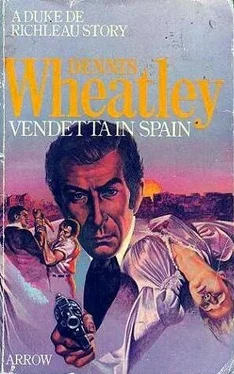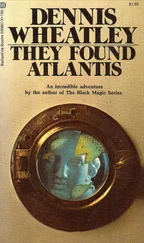She shook her head. 'You have defined Socialism but not anarchism. They have certain aims in common, of course, but differ fundamentally in the type of society they wish to bring about.'
After a moment's thought de Quesnoy said, 'What you say interests me tremendously. During the past week I have had the opportunity to acquire a considerable amount of information about the militant anarchists; but I had no idea that their doctrines, exclusive of violence, were accepted by great numbers of law-abiding citizens. In common with most people of our class, I think, I had, too, taken it for granted that, as it is the anarchists who claim kudos for most of the acts of violence committed during strikes, they were Socialists with extreme views. Please tell me now about this fundamental difference between the two creeds.'
'Give me a cigarette, and I will,' Gulia replied.
'So you smoke,' he smiled, producing his case.
She laughed. 'Yes, sometimes in private; although the Infanta still considers even that somewhat reprehensible in a woman.'
'Indeed?' de Quesnoy raised his eyebrows. 'Having all her life had to conform to the stiff etiquette of the Spanish Court has naturally given her a rather forbidding manner, yet I had formed the impression that beneath it she is a very human person. But no matter; please go on.'
He lit the cigarette for her and Gulia continued. 'When you said a while back that the Socialists aim for a Workers' State you were right. Their aim is to better the lot of the masses by nationalizing all the social services and canalizing the whole wealth of the country into the Treasury, so that it should be redistributed by free education, pensions for people who are too old to work, a fund to support those who are temporarily unemployed through no fault of their own, demolishing slums and building great blocks of modern workers' flats in their place, increasing the number of hospitals and giving free medical treatment to everyone, and so on.
'To do that would entail the creation of a vast non-productive bureaucracy which would eat up most of the money coming in before any surplus got back through these projects to the people who had earned it. Still worse, the central government would control everything and everybody: where people lived, the hours they worked, what they did with their leisure, and how they brought up their children. Carried to its logical conclusion Socialism becomes Communism, the only difference between the two being that, while the Socialists are prepared to wait until they can gain their ends by legal means, Karl Marx advocated attempts to achieve them more rapidly by insurrection. If either triumphed, in the long run the State would own everything; no one would be permitted to own land or any form of property, or to accumulate money to leave to his relatives. It would be the utter negation of freedom; we would all be slaves of the State.'
De Quesnoy nodded. 'I agree. The whole basis of Socialism is that the government should control the entire wealth of a country and the labouring capacity of its people. To do that would be impossible unless it had absolute power, and used compulsion to force on people the way they should lead their lives. Now, what about anarchism?'
'That is utterly different. The anarchist claims to be a law unto himself. That is no new thing. Zeno, the Greek philosopher who founded the Stoic school, was of that opinion; so were the powerful sect of Gnostics in early Christian times. The doctrine of Atheism was preached by many profound thinkers during the Middle Ages: Joachim, Abbot of Fiore, in Calabria, Amaury of Chartres, and Father John Ball, who played a big part in Wat Tyler's rebellion. It was because the men who took part in that rebellion believed that law enforced by the State was an evil and crippling thing that, on reaching London, their first act was to burn down the great law offices in the Temple.'
'Of course, there have always been individualists all through history. But militant anarchism as we know it began only in the 1870s. What gave rise to this modern creed that has become such a menace to the social order at the present day?'
'Michael Bakunin did more than anyone to formulate its principles. He argued that the State was a product of religion and an historically necessary evil representing a lower form of civilization °ut of which mankind is now sufficiently advanced to pass; and he demanded its complete abolition. He wished to do away with all legislation and claimed full autonomy for each nation, region and commune. He also held that all individuals should be given full independence, because one becomes really free only when all others are free. Working upwards from the individual, free federations of communes would become free nations. In such nations everything necessary for production would be owned in common by each Labour group or Commune, and each group would administer its own affairs independently of the others.'
Stubbing out her cigarette, Gulia concluded, 'So you see anarchism is the complete antithesis of Socialism. Not a single peseta would be wasted on a non-productive bureaucracy. The millions that even now are squandered in that way would be sufficient for every family to live in comfort. The profits of labour would go to those who earned them, and everyone would have the opportunity to develop their own individualities as they wished. That would be real freedom, and it is that which anarchism offers.'
Tn theory the case sounds a good one,' de Quesnoy admitted, 'but in practice I cannot believe that it could be made to work. All the same, I'd like to know more about it.'
'Then to start with you should read Paul Eltzbacher's book called Anarchism , in which he gives a very full account of the men he terms the Seven Sages and of the principles they laid down. They were Bakunin, Proudhon, Max Stirner, Prince Kropotkin, William Godwin, Count Tolstoi, and, I think, yes, the American, Benjamin Tucker. Unfortunately he does not include chapters on Count Carlo Cafiero or Fanelli, the two greatest of Bakunin's disciples who carried his doctrines to Italy and Spain; but you can learn about them elsewhere.'
'I thought Max Stirner was a close associate of Marx, and so a Communist,' the Count remarked.
'He was at one time. To begin with all these champions of the oppressed masses united to form a common front. It was Bakunin who organized it by founding the International Working Men's Association. They held a number of Congresses, but it soon became apparent that the views of the principal speakers at them were hopelessly irreconcilable. Marx had the greatest number of followers so he took over the International, while Bakunin and his followers seceded from it and formed a new Association called the Federation Jurassienne. It was that body that initiated Propaganda by Deed.'
'What exactly is meant by that?'
'It is the anarchist term for acts of violence. The militant anarchists argue that if one accepts the proposition that all laws and authority are wrong, it becomes right to endeavour to destroy the whole social fabric that law and authority have built up. Since they are in such a small minority they know that they have no hope of attaining their ends by open revolt: but, they reason to themselves like this—"It is for us to set an example and by so doing draw attention to ourselves and our principles. When the masses see that by our deeds we are striking terror into the oppressors they will take heart, acclaim us, rise and overthrow the whole social structure." '
De Quesnoy gave a grim little smile. 'They certainly must have caused plenty of people in high places a lot of sleepless nights. But I think the chances of their ever succeeding in bringing about a revolution are extremely small. *And even if they did they would gain nothing by it. They would only have smoothed the path for the Socialists, and ultimately the Communists.'
Читать дальше












